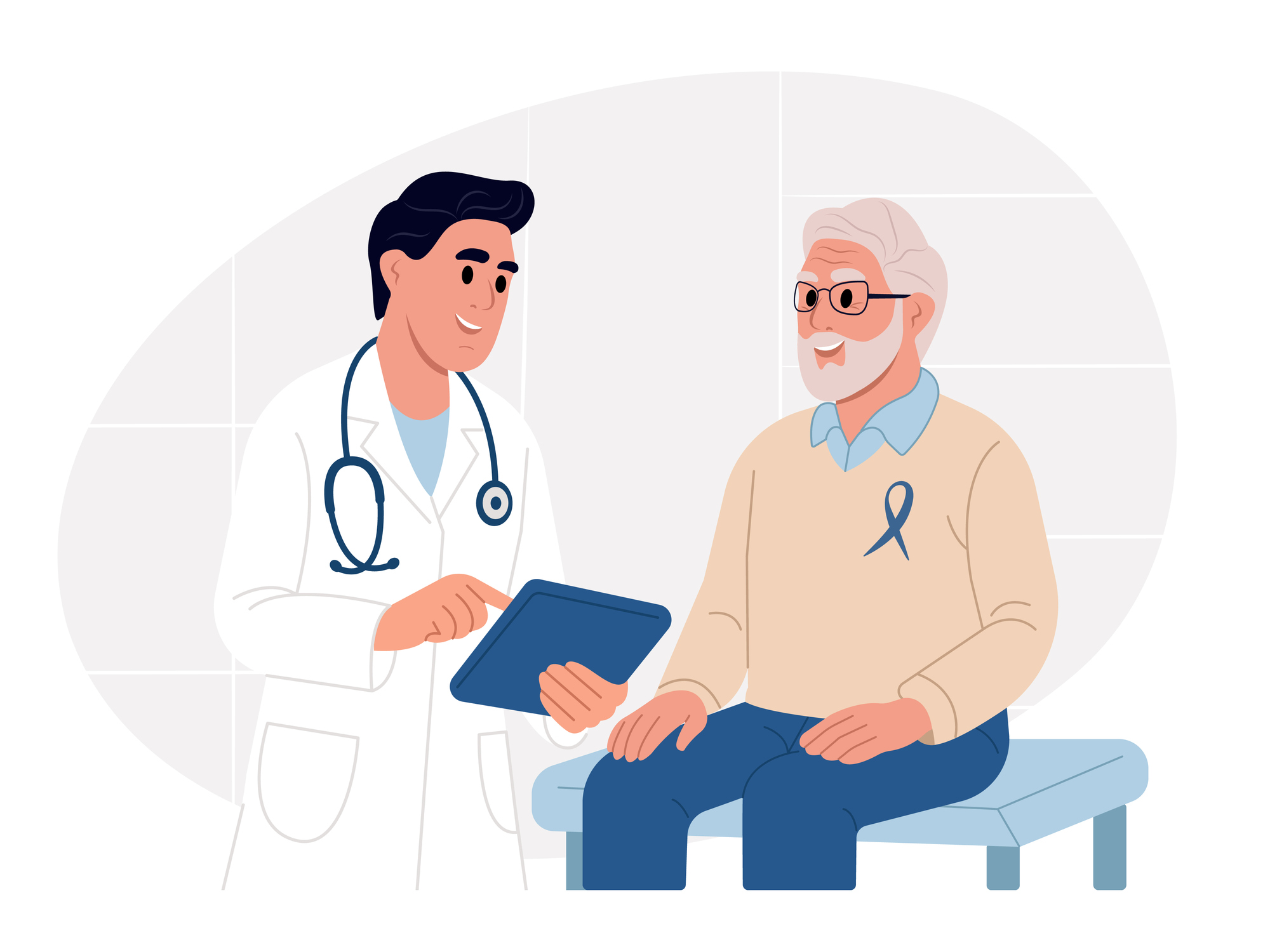Is Tadalafil Safe?
By Jillian Foglesong Stabile, MD, FAAFP, DABOM
October 21, 2025
Prescription Drugs, Your Health & Wellness

Is Tadalafil Safe?
Is it Safe to Take Tadalafil Daily?
Tadalafil, which is also marketed under the brand name Cialis, is a medication that is used to treat erectile dysfunction (ED), benign prostatic hypertrophy (BPH), and pulmonary artery hypertension (PAH). Tadalafil is available in either as-needed dosing to take prior to sexual activity or as once daily dosing for ED, BPH, or PAH. So, if you're wondering, "Is tadalafil safe?" the short answer is yes, it is generally safe to take daily.
How to use tadalafil safely: practical tips
Tadalafil is safe, but you can take steps to ensure you use it safely. Here are some practical tips.
Take tadalafil as directed by your healthcare provider
First and foremost, you should always take tadalafil as directed by your healthcare provider. Tadalafil comes in a wide range of doses and can be administered either daily or as needed. Your healthcare provider can work with you to determine the most appropriate dose of medication for your unique healthcare needs. They can also help you determine whether daily or as-needed dosing is more appropriate for you. In short, is it safe to take Cialis daily? Yes, if your healthcare provider recommends it. If you miss a dose of tadalafil, do not take an extra dose to make up for it unless directed to do so by your healthcare provider.
Monitor your blood pressure
Tadalafil can lower blood pressure. While most people who use tadalafil do not need to monitor their blood pressure regularly, your healthcare provider may recommend that you check your blood pressure periodically, especially if you are on other medications for blood pressure. Many people who have high blood pressure wonder, "Is Cialis safe with high blood pressure medicine?" Cialis, or tadalafil, may interact with certain classes of medications used to treat cardiovascular disease. There are a couple of classes of medications that are generally not used or are used with more caution. However, in general, people who are on most classes of blood pressure medication can take tadalafil.
Keep current on preventive care
Preventive care is important for several reasons. Preventive care enables healthcare providers to diagnose medical conditions in their early stages, when they are easier to treat. This can help reduce the risk of disability and even death. Preventive care is important for everyone, but this becomes even more important for people with chronic conditions or who are on other medications, including tadalafil.
Avoid alcohol
Alcohol can make erectile dysfunction worse. Additionally, alcohol can increase the risk of side effects from tadalafil. Alcohol can cause the blood vessels to dilate. Because tadalafil can also dilate blood vessels, combining the two can increase the risk of dizziness, headaches, and other symptoms. Tadalafil can last for up to 36 hours, so using alcohol, even hours later, can increase the risk of side effects.
Don't eat grapefruit
This may seem unusual, but grapefruit can interfere with tadalafil, as well as several other medications. Grapefruit contains compounds that interfere with one of the enzymes that metabolize medications in the liver and intestines. This enzyme, the CYP3A4 enzyme, is inhibited or slowed by grapefruit, which can increase the risk for side effects. This effect can last up to 3 days, so avoiding grapefruit altogether is your best bet.
Notify your healthcare provider of changes in medications or health
Tadalafil has the potential to interact with other medications, so it is essential to inform your healthcare provider of any changes in health or medications to avoid potential unsafe interactions. Tadalafil is metabolized in the liver and cleared from the body by the kidneys. If you develop impairment of either of these symptoms, you may need your dose of medication adjusted. Additionally, other medications that can impact how the liver metabolizes tadalafil, such as those that affect the CYP3A4 enzyme system, can affect how long tadalafil stays in your system and how likely you are to develop side effects. Communicating changes in your health status or medications to your healthcare provider is vitally important to helping you take tadalafil safely.
Monitor for side effects
Any medication may potentially cause side effects, and tadalafil is no exception. Tadalafil has several potential side effects, some of which are more common than others. Some side effects can be serious, so it's essential to monitor for them and notify your healthcare provider if you experience any.
Common side effects
Some of the common side effects of tadalafil include:
- Headaches
- Heartburn
- Abdominal pain
- Indigestion
- Back pain
- Muscle Aches
- Nasal congestion
- Flushing
Potentially serious side effects
Some potentially serious side effects of tadalafil include:
- Low blood pressure
- Pain in the arms or legs
- Hearing loss
- Vision changes
- Nausea
- Dizziness
- Rash
- Hives
- Swelling of the lips, tongue, or throat
- Difficulty breathing
- Priapism (a prolonged erection lasting more than 4 hours)
These aren't the only symptoms that tadalafil can cause, so check in with your healthcare provider if you feel anything unusual.
Who shouldn't take tadalafil?
Several groups of people should either not take tadalafil or should take it with caution (or adjustments to dosing).
Nitrates
Is Cialis safe for heart patients? Possibly, some medications make may make cialis unsafe. Nitrates are a common medication used to treat heart conditions, like angina and coronary artery disease. They relax blood vessels to improve blood flow. Erectile dysfunction medications such as tadalafil also cause vasodilation (relax blood vessels). When the two medications are taken close to each other, it can cause dangerous drops in blood pressure. Because of this, it is not recommended that people who take nitrates use PDE5 inhibitors, including tadalafil.
GC stimulators
GC stimulators are medications used to treat pulmonary artery hypertension and heart failure. Similar to nitrates, these medications cause vasodilation and relaxation of the blood vessels, which can lead to dangerous drops in blood pressure.
Other phosphodiesterase 5 (PDE5) inhibitors
Cialis is one of several medications in the class of phosphodiesterase 5 inhibitors. Other medications in this class include sildenafil (Viagra), vardenafil (Levitra), and avanafil (Stendra). Because these medications all have the same mechanism of action, although they have different durations and onset times, you should not use these medications together.
Blood pressure problems
People who have low blood pressure (hypotension) should not take tadalafil because it can make the blood pressure too low, which can lead to dizziness and even loss of consciousness. For people with high blood pressure that is not controlled, tadalafil can cause dangerous drops in blood pressure. The medication may also increase the risk of heart attacks, stroke, and irregular heartbeats. People with uncontrolled high blood pressure may also be at an increased risk of side effects from tadalafil. Your healthcare provider may start tadalafil and other medications if your blood pressure has been treated and is well controlled. This is one reason you may want to monitor your blood pressure and keep your healthcare provider apprised of any changes to your health.
Cardiovascular disease
Those who have had recent medical events, such as a heart attack within the previous 3 months, generally should not take tadalafil. Tadalafil may be unsafe in this population. Additionally, unstable angina, uncontrolled arrhythmias, and even heart failure can increase the risk of side effects in people with tadalafil.
Eye problems
Retinitis pigmentosa is an eye condition that affects the phosphodiesterase enzymes in the retina. There is limited information available about how tadalafil and other PDE5 inhibitors may affect people with this condition. For this reason, it is generally recommended to avoid tadalafil and other PDE5 inhibitors if you have retinitis pigmentosa.
Blood disorders
Priapism is a known potential side effect of tadalafil. Several conditions may increase your risk of priapism, especially if used in combination with medications such as tadalafil. Some blood disorders that may increase this risk include:
- Multiple myeloma
- Leukemia
- Sickle cell anemia
Penile problems
Some people who have abnormalities of the penis, such as a significant curve, Peyronie's disease, and similar conditions, may not be able to take tadalafil due to an increased risk of priapism.
Liver disease
Because tadalafil is metabolized in the liver, people who have severe liver disease may not be able to take tadalafil due to an increased risk of developing significant side effects. People with mild to moderate liver disease generally can still take the medication under close supervision by their healthcare provider.
Kidney disease
Similar to liver disease, kidney disease can also increase the risk of side effects related to tadalafil. The kidneys clear tadalafil from the system, and kidney disease can slow this process, increasing the risk of side effects. People who have severe kidney disease or who are on dialysis may not be able to take tadalafil. Dialysis may not reliably remove the medication from the blood. Those who have moderate kidney disease may need to have a lower dose of the medication. If you have kidney disease, your healthcare provider can help you determine whether tadalafil is safe and recommend the appropriate dose.
Allergy to tadalafil or its components
Anyone who has had an allergic reaction, such as hives or swelling of the lips, tongue, or throat, should not take tadalafil or any of its components.
When to stop taking Cialis: Tadalafil warnings
If your healthcare provider has prescribed tadalafil for pulmonary artery hypertension, you should not stop taking the medication unless specifically directed to do so. If you experience other side effects, you may need to stop the medication. Stop tadalafil immediately and get emergency medical attention if you experience:
- Priapism: an erection lasting more than four hours can permanently damage the penis, so it is important to get immediate medical attention if you experience this
- Vision loss
- Sudden hearing loss, especially with dizziness or ringing in the ears
- Chest pain or pressure
- Pain in the jaw, shortness of breath, or nausea
- Swelling in the face or tongue, rash or hives
- Severely low blood pressure
It may also be important to reconsider your use of tadalafil if you develop changes in your overall health, such as developing heart, liver, or kidney disease, or if you are started on a new medication such as nitrates. If you are taking tadalafil for BPH and your urinary symptoms worsen, it is important to talk to your healthcare provider about your symptoms, which could indicate other health conditions or be an indication that your medications need to be changed. So people may choose to stop taking tadalafil because they no longer need it for erectile dysfunction or because they just don't want to take it anymore.
Read more about the side effects of tadalafil
For more information on the side effects of tadalafil, please visit this page.
Key takeaways
- Tadalafil is used for erectile dysfunction, benign prostatic hypertrophy, and pulmonary artery hypertension
- Tadalafil is safe for most people, but people with underlying medical conditions, especially related to the heart, liver, or kidneys, should consult with their healthcare provider
- Stop tadalafil and seek emergency medical attention if you develop a serious side effect such as a prolonged erection, hearing or vision loss, or chest pain
- Take tadalafil only as prescribed by your healthcare provider
- Other things that you can do to improve the safety of tadalafil include avoiding alcohol and grapefruit, keeping current on your healthcare, and communicating health changes to your healthcare provider
FAQs
Is it safe to take 10mg of tadalafil daily?
The 10mg dose of tadalafil is usually used on an as-needed basis for erectile dysfunction. In some cases, your healthcare provider may recommend taking it daily. You should only take tadalafil 10mg daily if your healthcare provider has specifically recommended it. For BPH and ED, the daily dose of tadalafil is usually lower than 10mg.
Is it safe to take 20mg of tadalafil daily?
The 20mg dose of tadalafil is usually taken as needed for erectile dysfunction. It may be dosed daily in some people, such as those with pulmonary artery hypertension. The usual daily dose of tadalafil is 2.5-5mg. Taking tadalafil 20mg daily can increase the risk of side effects for many people, so you should not take tadalafil 20mg daily unless specifically instructed to by your healthcare provider.
How much Cialis is safe to take?
The safest dose of Cialis is the one that is recommended by your healthcare provider for your specific health condition and circumstances. Common doses of Cialis, by condition, include:
- Erectile dysfunction: 2.5-5mg daily or 10-20mg as needed. In some cases, your healthcare provider may recommend using 5mg as needed if this is effective for you for ED or if you have a condition that puts you at higher risk of side effects, such as liver or kidney disease.
- Benign prostatic hypertrophy: 2.5-5mg daily is the most common dose prescribed for this condition. Because BPH is a daily, chronic condition, as-needed dosing is generally not as effective.
- Pulmonary artery hypertension: Cialis, or tadalafil, is often prescribed at 20-40mg daily for this condition.
Is tadalafil safe for heart patients?
Tadalafil may be safe for some heart patients. Tadalafil is not recommended for people who have had a recent heart attack or who have uncontrolled blood pressure. It is also not safe for people who take nitrates, as dangerous drops in blood pressure can occur. However, a 2025 study in the American Journal of Medicine showed that both tadalafil and sildenafil improve the risk of death from any cause (all-cause mortality) and the risk of heart attack, stroke, blood clots, and dementia. More research is needed on this topic.
Is tadalafil a blood thinner?
Tadalafil is not a blood thinner, but it does cause the blood vessels to dilate. This can improve blood flow to the penis, which is one of the ways that the medication helps with erectile dysfunction and pulmonary artery hypertension. This dilation can also increase the risk of low blood pressure. Tadalafil belongs to a class of medications called phosphodiesterase type 5 (PDE5) inhibitors. These medications relax smooth muscle in addition to relaxing blood vessels. So while it can decrease blood pressure, tadalafil generally does not increase the risk of bleeding.
Is tadalafil safer than Viagra?
Tadalafil is generally as safe as Viagra for most people. Both medications are considered safe and effective for erectile dysfunction. Both medications are also used for pulmonary artery hypertension. Tadalafil and Viagra have different durations and onset of action times. The best or safest medication for you may depend on your unique health factors. Your healthcare provider can help you determine which medication to use.
Is tadalafil bad for the long term?
Tadalafil has been studied for both short and long-term use and is usually well-tolerated and safe. It should be noted that most of the research is applicable for use up to two years, and there are no studies that examine longer-term use, such as over decades. Most of the side effects of tadalafil are mild and even improve with longer-term use. However, if you develop new health conditions or more serious side effects, it may not be safe to take tadalafil for long periods of time. If you are concerned about long-term use of tadalafil, you should talk to your healthcare provider before stopping or changing your medication.
Is it safe to exercise after taking Cialis?
For most people, it is safe to exercise after taking Cialis. Your healthcare provider can advise you whether it is safe for you. Because Cialis is used to promote erectile function for sexual intercourse, most people are healthy enough to exercise while on the medication. Sexual intercourse often increases heart rate and requires some degree of physical exertion.
Medication savings with ScriptSave® WellRx
Medication is expensive. If your healthcare provider has recommended medication to treat erectile dysfunction, benign prostatic hypertrophy, pulmonary artery hypertension, or any other medical problem, consider visiting us at WellRx. Some people save a little. Some people save a lot. Prices vary across zip codes. Even pharmacies across the street from each other can have huge price differences. Our aim is to bring transparency to prescription medication pricing, helping consumers keep more money in their pockets. The average savings is 65%, but you may save up to 80%.* ScriptSave has been helping consumers save on their prescriptions for 25 years. *DISCOUNT ONLY – NOT INSURANCE. The program is administered by Medical Security Card Company, LLC
References
https://www.ncbi.nlm.nih.gov/books/NBK603743/
https://www.nhs.uk/medicines/tadalafil/how-and-when-to-take-tadalafil/
https://pmc.ncbi.nlm.nih.gov/articles/PMC8845461/
https://odphp.health.gov/healthypeople/objectives-and-data/browse-objectives/preventive-care
https://academic.oup.com/jsm/article-abstract/2/4/517/6863149
https://pmc.ncbi.nlm.nih.gov/articles/PMC3589309/
https://www.thecardiologyadvisor.com/features/erectile-dysfunction-drugs-and-nitrates/
https://www.sciencedirect.com/science/article/pii/S0735109703012932
https://www.jwatch.org/na54872/2022/04/28/can-pde5-inhibitors-be-coprescribed-with-nitrates
https://www.ncbi.nlm.nih.gov/books/NBK537151/
https://www.ncbi.nlm.nih.gov/books/NBK549843/
https://www.nhs.uk/medicines/tadalafil/who-can-and-cannot-take-tadalafil/
https://www.nhs.uk/medicines/tadalafil/side-effects-of-tadalafil/
https://www.amjmed.com/article/S0002-9343(24)00705-8/fulltext
Recommended Articles









